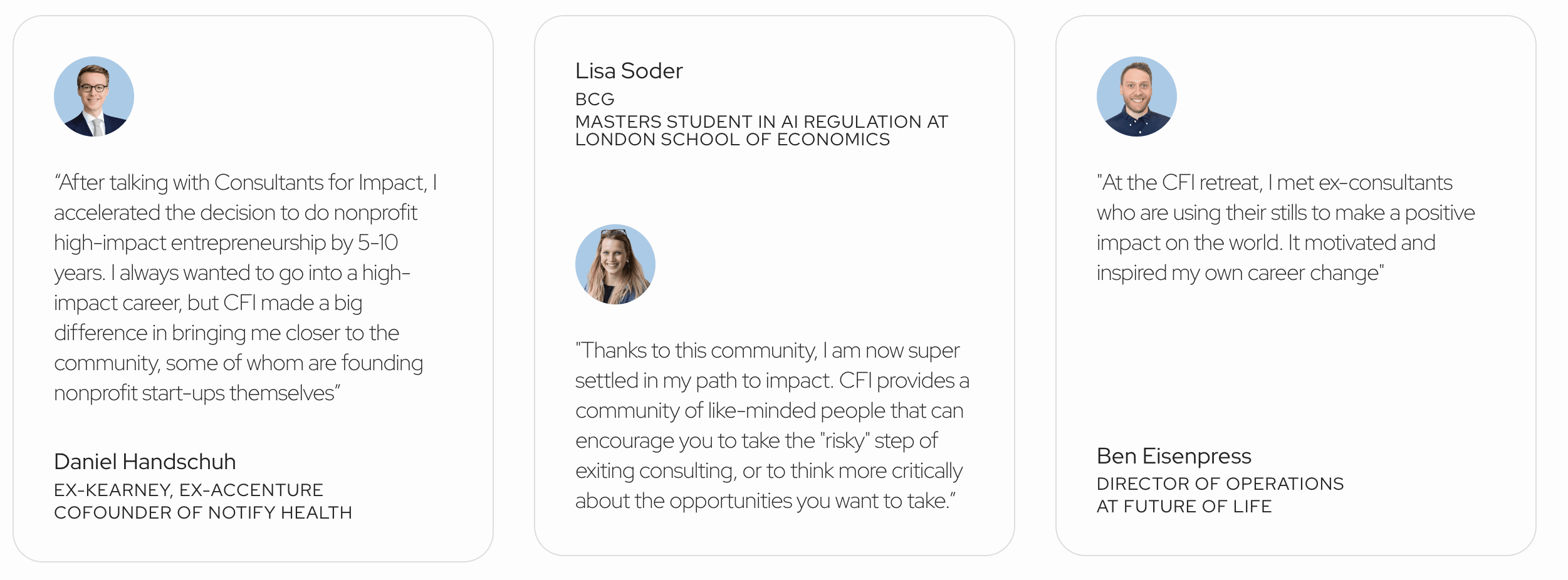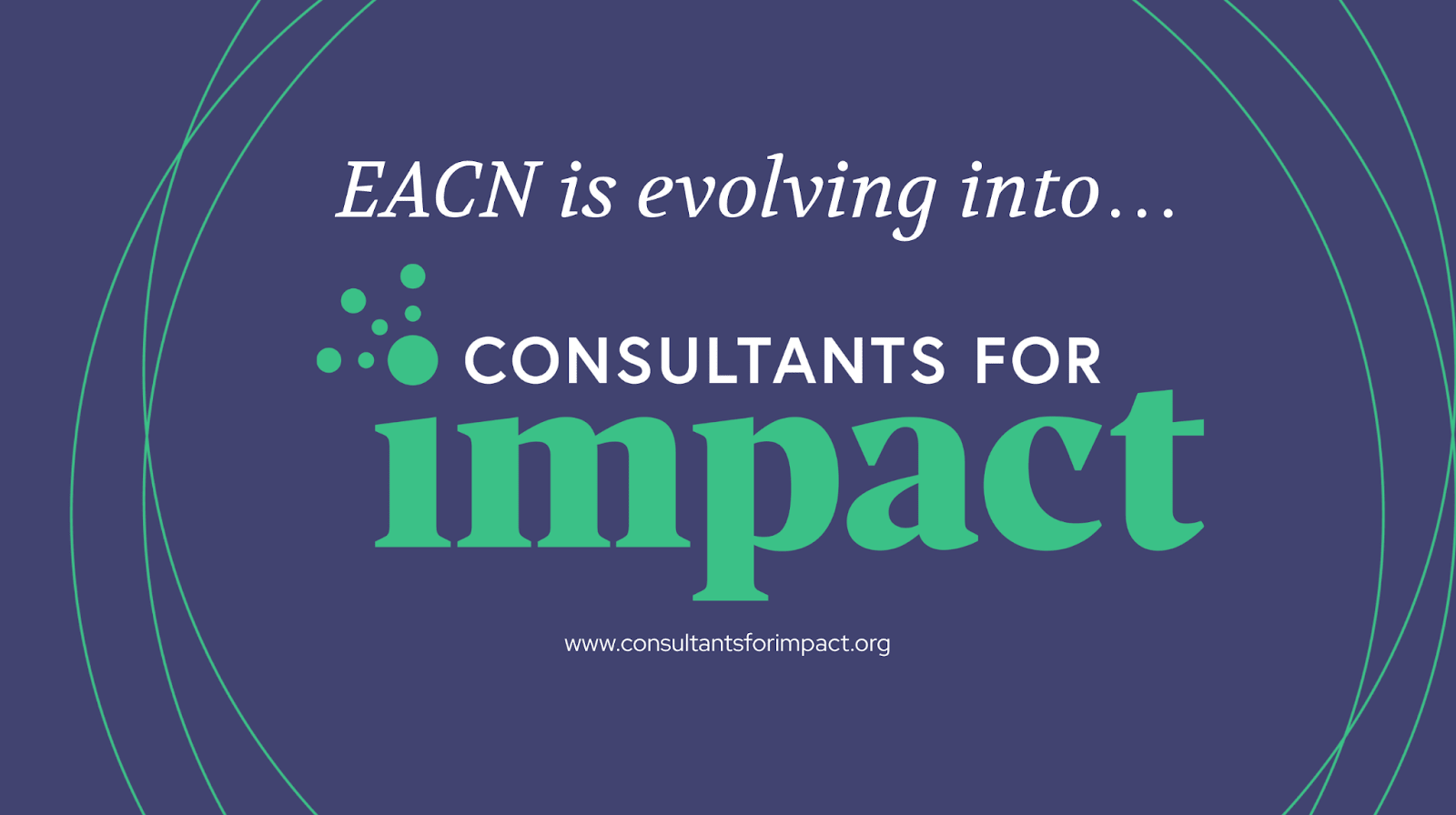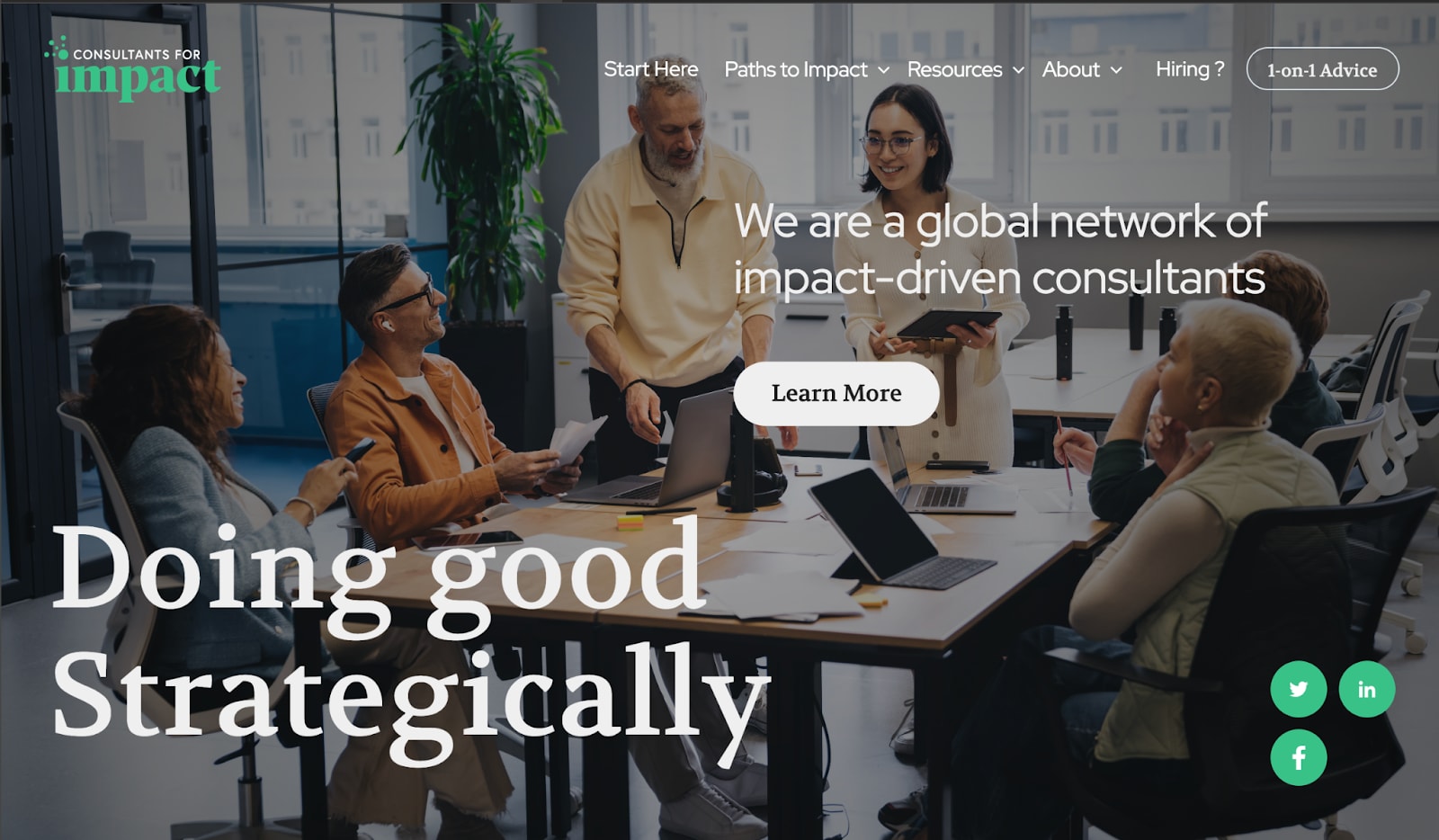Summary
After spending the past 5 years advising hundreds of consultants on how to optimize their career and donations for impact, seeding EA workplace groups within McKinsey, BCG, Bain, and beyond, and supporting 30+ career transitions, the EA Consulting Network is evolving into Consultants for Impact. We’re excited to continue helping high-impact teams and consulting talent to find each other!
About Consultants for Impact
Since 2019, Consultants for Impact (formerly the Effective Altruism Consulting Network) has been dedicated to supporting current, former, and prospective consultants in strategically optimizing the social impact of their careers.
We do this by:
- Prioritizing consultants who are highly committed to impact and are at career inflection points: We identify consultants who we believe are well-placed to have a high-impact career and support them with Career Conversations, introductions, retreats, and curated opportunities.
- Inspiring significant action by amplifying those who led by example: We emphasize the importance of high-impact work to business consultants and amplify motivating stories of former consultants engaged in direct work to make less common impact-oriented career paths feel tangible and socially viable.
- Connecting consultants to meaningful and analytically driven work: We strive to outcompete other consulting exit-career paths by connecting our members with career opportunities that are more value-aligned than typical business roles and more skill-aligned (problem-solving focused, analytical, fast-paced, etc.) than typical social impact oriented roles.
Why Focus on Consultants?
We believe that business and strategy consultants have an outsized potential for professional impact as a talent pool, as supported by:
- Demand for Consulting Skills: We’ve heard from hiring managers at EA organizations that they are bottlenecked for talent with strong management, strategic, and operational capabilities (i.e. EA Community Survey (MCF 2023), 2019 Talent Gap Survey), skills that consultants disproportionately possess.
- Pre-vetted Talent: Strategy consulting is a very competitive field, with a demanding process of business case interviews and sometimes additional tests of decision-making and general intelligence. Firms often have over 100 applicants per place and the largest firms expend significant resources in their recruitment processes.
- Desire for Career Changes: The churn in consulting is comparatively high and as such many candidates are eager to identify their next career move after only one or two years in their role. Given the relatively short tenure of the average consultant, Consultants for Impact can leverage the steady stream of trained and talented folks, often a few years out of university, and support them in building longer career paths to impact.
- Track Record of Consultants in EA: Many successful senior EAs are former consultants (ex. Habiba Banu, Rob Gledhill, Zach Robinson, Paige Henchen) and we’ve already seen our hypothesis validated by the 30+ consultants whose career transitions into high-impact roles we’ve supported.
Evolution to Consultants for Impact
We are evolving into Consultants for Impact because we believe this new brand will better enable us to achieve our mission. Our new name gives us greater brand independence and control and provides a more professional presentation. It also enhances our capacity to accurately reflect the diverse philosophical frameworks (including, but not exclusively, Effective Altruism) that can benefit our work. We are excited about this transition and believe it will enable us to better support and inspire consultants dedicated to making a significant social impact.
Our Programs
Since hiring a full-time team member in 2022, we’ve focused on experimenting to find highly impactful and cost-effective programs to optimally support our talented audience in exploring their values and identifying their professional path to impact.
In 2024, based on promising early results and positive feedback, we are excited to continue:
- Conducting 1-1 Career Conversations: We offer structured, one-on-one career plan development and support calls with current, former, and prospective consultants considering how to have a higher impact in their careers. These conversations often include relevant introductions post-call.
- Hosting weekend-long retreats: Designed for current consultants actively exploring a pivot into higher-impact work, these retreats feature former consultant speakers, cause prioritization workshops, relationship building, and personalized career planning.
- Providing curated talent referrals: For especially promising roles and organizations, we work with hiring managers to offer custom referrals and introductions to Consultants for Impact members who are most likely to fit.
- Sending out our bi-weekly Job Blast: Our Job Blast features the top 10 high-impact roles we believe consultants could be an especially good fit for.
- Advising leaders of value-aligned Workplace Groups: We coordinate and support impact-driven communities within top strategy and management consulting firms (e.g., McKinsey, Bain, BCG, Accenture) to launch initiatives and support each other’s career journeys.
- Creating custom resources: We develop tailored materials such as giving guides and career reflection templates to help consultants navigate their journey towards higher-impact careers.
We’re excited to continue experimenting with our programming to find even better ways to support our consultants. Stay tuned, as we plan to pilot a new initiative later this year.
Our Progress
Since our founding, we have:
- Provided 1-1 support to 500+ consultants through our Career Conversations program
- Facilitated 1,500+ professional introductions for our members
- Meaningfully supported 30+ of our members’ transitions into high-impact careers
- Seeded and supported active workplace groups at 10 top consulting firms
- Supported high-impact organizations in finding candidates for 70+ hiring rounds

We’re Excited to Support You!
For Consultants
As we transition to Consultants for Impact, we invite you to explore how you can optimize your career for greater social impact. Apply for a Career Conversation to receive tailored guidance and support. If you know other consultants passionate about making a difference, encourage them to check out our website and consider applying themselves.
For EA Org Team Leaders and Recruiters
If you are hiring, have a low bar for reaching out to us to find top-tier candidates. We provide curated talent referrals, connecting you with consultants who are not only highly skilled but also deeply committed to making a positive social impact. Check out our website to learn more about the types of work we think consultants can be especially useful.
For Community Members
Help us spread the word about our rebrand to Consultants for Impact. If you know any consultants in your network, share our website and resources with them. Additionally, if you're chatting with someone in the ecosystem looking to hire, we’d appreciate you letting them know about our referral services.
__________________________________________________
We want to extend our heartfelt thanks to everyone who has helped bring Consultants for Impact to where it is today. To the founding members of the Effective Altruism Consulting Network, your vision laid the foundation for our journey.
We are grateful for the brand evolution support from Jane Julian, Kate Rodman, @Amber Dawn, @James Odene [User-Friendly], Jennifer Ipsen, Emily Dardaman, our strategic advisory board members Paige Henchen, @David Nash, @Anneke Pogarell, and Lauren, and our fiscal sponsor @Rethink Priorities.
Thank you to the countless individuals who provided feedback and input throughout this process. Most importantly, we thank every consultant who has dedicated their career to the goal of making the world a better place. Your commitment inspires us and drives our mission forward. Together, we are poised to make an even greater impact.




Why not consultants for shrimpact?
It was a top contender!